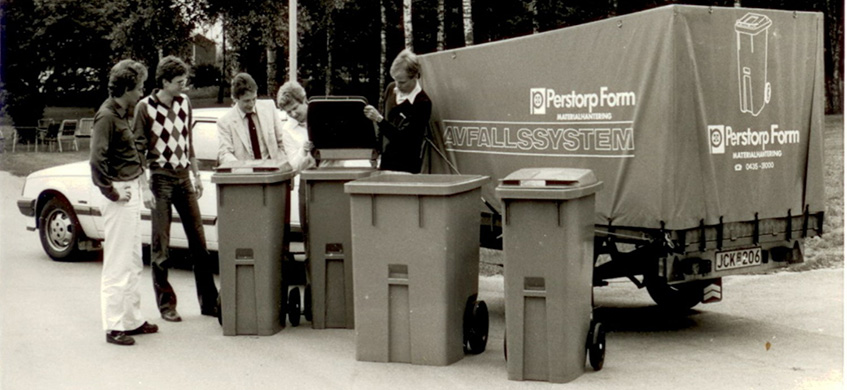
PWS History
At the leading edge since the launching in 1984
The first container revolutionized the waste industry
On June 1, 1984, the first PWS container came out on the market and launched in Malmö with large media attention. For two years, Perstorp Form had worked in close collaboration with Malmö municipality, a garbage truck manufacturer and the Swedish Renewable Association, developing a new revolutionary waste system. The container were based on a whole new concept and did not resemble anything else in the Nordic region or in Europe. The result was a series of functional and durable plastic waste containers, which made paper bags unnecessary. The square shape of the PWS container gave a better weight distribution and the larger wheels rolled easily. Heavier containers were provided with an ergonomic footstep, to facilitate tilting when moving.
From waste to resource
When PWS started, waste was something nobody wanted. What was thrown into the bin was drove away and piled up. Today waste is a resource. PWS develops products for efficient waste management. We work to make it easy and convenient to recycle waste and utilizing more resources. During these years we have been involved in and developed products that have revolutionized waste management and brought the concept of "waste" to "recyclable and reusable", with a value to count on.
The development from waste to resource has resulted in the development of a wide range of products, where the UWS underground system and Quattro Select waste system are two of the company's most important and most successful products, as well as well-designed public furniture and litter bins. PWS continuously develops its product range to meet market needs, through its own production and through close cooperation with customers.
Knowledge and experience
After its successful start, PWS has now delivered more than six million containers to different municipalities around the Nordic countries - from southern Sweden to northern Norway. It has given the company extensive experience and knowledge about how to adapt the products to Nordic conditions and the demanding climate to which these products are exposed.
Today, PWS's main activities are concentrated on the Nordic countries; Sweden, Denmark, Finland, Norway and Iceland, where we are twenty-five employees, mainly in sales and customer support. PWS has delivered more than six million containers in the Nordic region from southern Sweden to northern Norway. It has given the company extensive knowledge of how to adapt the products to the demanding Nordic climate that these products encounter.
ESE since 1934
Since 1997, PWS has been part of ESE World and has gained extensive experience of more than 80 years of manufacturing, development and sales of waste containers in all European countries. ESE's history stands for development, tradition and lasting customer loyalty. Waste management and collection systems are and remain ESE's core business.
In 1934, 6 brothers established the OTTO company in Kreuztal, North Rhine-Westphalia, Germany, and began to manufacture steel containers.
OTTO discovered early that waste management was primarily a matter of improving parts of the process. This led to a great skill in processing and still today are expressed in the wide range of products and services offered by ESE, and PWS.
In 1950, Willi Otto developed an innovative lifting container for waste containers. In 1964, the first circular plastic containers was launched between 35 and 110 liters. In 1972 the classic waste container was launched; a 2-wheel 240 liter tank, the so-called DIN comb pickup. OTTO's containers were patented and DIN comb pickup became a world standard.
During the 1980s and 1990s, they invested in liquid injection moulding machines and expanded product range with a multipurpose container capable of collecting two different fractions in a single container.
At the beginning of the 2000s, the first underground and semi-underground systems were introduced. Additional investments doubled the capacity for the production of 4-wheeled vessels.
In 2011, the name changed from OTTO to ESE World and in 2013, the Rheinwerk brand joined ESE under the brand ESE.

 Svenska
Svenska English
English Dansk
Dansk Suomi
Suomi